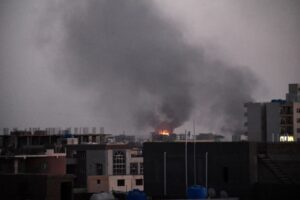Fighting between rival factions in Sudan poses a new problem for the Biden administration. What led to the conflict? Will the US rescue American citizens trapped in the African country? What are the wider geopolitical implications of Sudan’s fracturing? Liberty Nation’s National Security Correspondent Dave Patterson provides some insight.
Graham J. Noble: On April 23, US forces evacuated American diplomatic personnel from Khartoum, the Sudanese capital. What about any US citizens still in the country?
Dave Patterson: It was in the order of 50 to 70 embassy staff. They used CH-47 [helicopters] to evacuate that staff. What remains to be seen is the fact that you still have 16,000 – roughly – US citizens, many of whom have dual citizenship and they’re sort of left behind. There doesn’t seem to be any immediate plan to help them get out of Sudan – those who wish to. It’s not clear whether they actually want to be evacuated. It’s just really kind of a mess.
GJN: What military assets does the US have in the region – within or close to Sudan?
DP: We have a fairly decent contingent at Camp Lemonnier in Djibouti. It’s a naval installation and the United States has apparently moved a significant force there to support this evacuation. I thought it kind of odd, during one of the State Department briefings, that they talked about how they are using the same approach in Sudan as they had in other evacuations, where they focused simply on the embassy staff. But the fact is that in 2006, during the George W. Bush administration, he evacuated US citizens from Lebanon. There were about 15,000 of them and they used cruise liners and all manner of naval vessels to do that. So, it’s not like evacuating US citizens is not something that they have done in the past. One would think it was a part of their emergency action plan.
GJN: What can you tell us about the two rival factions fighting in Sudan?
DP: It’s an interesting dynamic. You have these two generals; General Abdel Fattah al-Burhan, who basically leads the Sudanese council. He represents the Sudanese government. On the other hand, you have General Mohamed Hamdan Dagalo, also known as Hemedti. He leads the paramilitary Rapid Support Forces, the RSF. This force was formed to support the previous Islamic ruler, Omar al-Bashir. So, these two generals were actually colleagues and co-conspirators, if you will, in bringing down President al-Bashir in 2019. At one point, the council gave the two generals the same status but that didn’t sit well with al-Burhan. There was a rift between the two, in terms of who was going to be in charge and how they were going to integrate the RSF into the standard army structure. Those disagreements turned into open hostility and then, around April 12, into actual fighting.

(Photo by Omer Erdem/Anadolu Agency via Getty Images)
GJN: Sudan and what is now the Republic of South Sudan fought a couple of multi-year-long civil wars between the 1950s and South Sudan’s independence in 2011. Does the current conflict have anything to do with South Sudan?
DP: The fighting is focused on these two competing powers in Sudan. That’s not to say there aren’t people who have very clear interests that are being threatened. You’ve got Russia, on the one hand, that has been supporting the Sudanese government with weapons and military aid and training. Then you have the Russian Wagner Group that is very much supporting the RSF because the RSF has control over the gold. The leader of the Wagner Group denies involvement in Sudan. But most press reports have the Wagner Group providing security for the gold mines that are under RSF control.
GJN: If the conflict continues to escalate, do you see US military involvement as a possibility? For that matter, would the US have any reason to get involved?
DP: With this administration, I think it’s unlikely. It has not been very proactive in geopolitical issues generally, with the exception of the US Navy’s Indo-Pacific Command which has been pretty aggressive in asserting US rights in the Taiwan Strait and the South China Sea. Other than that, I don’t think the Biden administration has much of an appetite for doing anything militarily to help evacuate any US citizens remaining in Sudan who might want to leave. But guess which two countries have not evacuated their embassies: Russia and China.
The Chinese aspire to become the new Middle East peacemakers, so they can easily come in and solve this problem in any number of ways and look like great negotiators and purveyors of peace – just as China would like to be seen.
All opinions expressed are those of the author and do not necessarily represent those of Liberty Nation.
Do you have an opinion about this article? We’d love to hear it! If you send your comments to [email protected], we might even publish your edited remarks in our new feature, LN Readers Speak Out. Remember to include the title of the article along with your name, city, and state.
Please respect our republishing guidelines. Republication permission does not equal site endorsement. Click here

